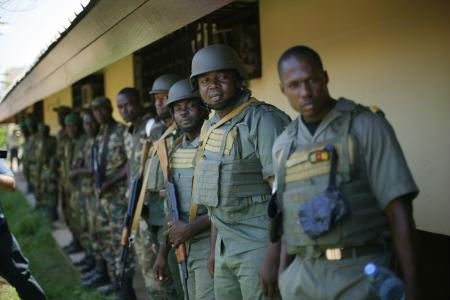
The U.S. ambassador to the United Nations on Wednesday urged more support for existing African and French troops in Central African Republic on the eve of a U.N. vote to create a peacekeeping mission.
Ambassador Samantha Power, making her second visit to the country since unprecedented sectarian violence erupted here in December, said the African peacekeeping mission is now working to fill the gap left by neighboring Chad. Last week the Chadian government began withdrawing its 850 troops following allegations some had indiscriminately killed dozens of unarmed civilians.
Power, who met Wednesday with top officials from the African peacekeeping, said that Cameroonian and French forces were being moved into the areas previously guarded by the Chadians.
“There’s no question that we need to redouble our efforts – we’re making them every day anyway,” she told reporters. “But this adds even more urgency to the task of getting more troops and more police deployed rapidly in order to fill those gaps which really do exist. ”
The U.N. Security Council is due to vote Thursday on expanding the nearly 5,000-strong African mission in Central African Republic into a U.N. peacekeeping operation for this country of 4.6 million people. The move is expected to strengthen efforts to secure the country where thousands have died since December, though such an operation will not be ready until Sept. 15, she said.
Central African Republic exploded into violence in early December amid mounting resentment toward a Muslim rebel government that had seized power in March 2013 by overthrowing the president of a decade. The rebel leader-turned-president had little control over his forces, who were blamed for raping, torturing and killing civilians particularly among the country’s Christian majority.
Once the government fell in January, Christian militia fighters began attacking Muslim civilians in retaliation, prompting tens of thousands to flee the country and leaving an untold number dead. African peacekeepers have helped protect and evacuate many civilians under threat, though in some cases they have stood by as mobs slaughtered people accused of having collaborated with the rebels.
At least 19,000 Muslims are still trapped and unable to flee, though there has been some hesitancy to evacuate them for fear of facilitating what the United Nations has described as “ethnic cleansing.” Power said Wednesday that part of the challenge is getting a sense of whether individuals want to leave or to try staying.
“What I think the U.N. is trying to do is to make sure we go on a case by case basis, and not have a situation where anybody who wishes to leave somehow feels pressed to stay simply for the sake of showing that there is still diversity in the Central African Republic,” she said.
Before becoming a diplomat, Power made her name as a vocal critic of Washington’s response to past atrocities. In a well-known book on the subject, Power asked the question: Why do American leaders who vow “never again” repeatedly fail to stop genocide?
Now she is trying to spotlight the horror in Central African Republic, even though she represents a government that has declined to join France in sending troops to quell the conflict. On Wednesday, she emphasized that the U.S. already has provided 37 vehicles to the peacekeeping effort and is sending 200 more.
At least 22 African peacekeepers and three French soldiers have been killed in Central African Republic since December.
